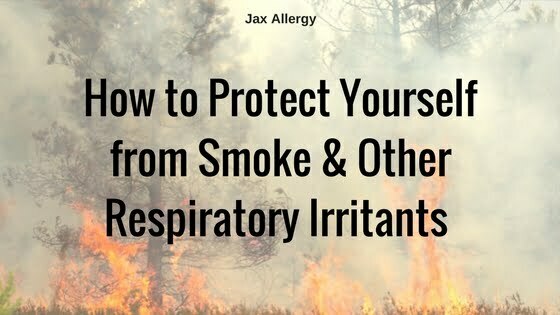How to Guard Yourself Against Forest Fire Smoke and Other Respiratory Irritants

Updated June 2020: with COVID-19 affecting many in Florida and the First coast people are opting to stay closer to home this summer. Instead of traveling for vacation, many are doing camping trips. Often people may not realize how campfire smoke and other irritants can affect their breathing and asthma. This can lead to serious health issues. Read on for more about protecting yourself from smoke and other irritants.
What to Know About Smoke Allergy and Other Respiratory Irritants
When forest fire smoke levels or other outdoor respiratory irritants are high, even healthy people can experience symptoms or health problems. It’s important to understand how forest fire smoke and outdoor irritants can affect your health, including who is most susceptible to reactions.
The Negative Effects of Forest Fire Smoke on Your Health
Forest fire smoke is a mixture of fine particles and gasses from trees and plant material. The gasses and particles can be dangerous if inhaled. Carbon monoxide is a risk to people who work near smoldering areas.
Smoke can irritate your eyes and respiratory system. This can worsen symptoms for chronic heart and lung diseases. If exposure to smoke causes you to experience serious health issues, seek medical attention immediately.
People Most Susceptible to Health Issues from Outdoor Irritants and Smoke
Those with pre-existing health conditions and those who are sensitive to air pollution may experience worse symptoms. Other groups susceptible to health issues include:
- Individuals with asthma or other chronic respiratory disease
- Individuals with cardiovascular disease
- Individuals age 65 or older
- Infants and children
- Pregnant women
- Smokers (especially those who have smoked for several years)
5 Tips to Reduce Exposure to Smoke and Other Respiratory Irritants
While the best thing you can do is limit your exposure to smoke, a combination of strategies may work best to protect you. The more you can do to limit your exposure to forest fire smoke, the more you’ll reduce adverse health effects.
Keep Indoor Air as Clean as Possible
Keep windows and doors closed at home or at work. Use a high-efficiency particulate air (HEPA) filter to reduce indoor air pollutions. In addition, remember to change your air filter on your furnace and air conditioner every few months. Avoid smoking tobacco, burning candles, using wood burning stoves or fireplaces, and vacuuming (which can stir up dust and particles).
Use the AC in Your Car
Avoid leaving your windows down and use your air conditioning on the recirculate setting for fresh, cool air.
Drink Plenty of Water
Flushing your system by drinking plenty of water helps remove irritants from your body. Drink up to reduce a scratchy throat and coughing to stay healthy during fire and pollen seasons.
Reduce Time Spent in Smoky Areas
Whether it’s a forest fire, campfire, or tobacco smoke, avoid being where smoke is present. While sometimes it may be unavoidable, less exposure to smoke is better for your health.
Avoid Outdoor Activities
Vigorous outdoor activities such as running, biking, soccer, or other sports should be avoided during times of high smoke levels or outdoor irritants. Limit your workouts to indoor gyms and sports centers.
Wear Proper Protection
In areas with high levels of forest fire smoke, a simple dust mask isn’t enough. An N95 respirator mask fits over your nose and mouth and can filter 95% of smoke particles. N95 respirators do not filter toxic gasses and vapors.
Be aware that these masks can make breathing seem difficult and may lead to increased breathing or heart rates. If you have a heart or respiratory disease, only use the mask under the supervision of your allergist or other health care clinician.
Are you concerned about exposure to forest fire smoke allergies or other outdoor allergies? Talk to an allergist at the Allergy & Asthma Specialist of North Florida about testing and a treatment plan to stay healthy this summer.
